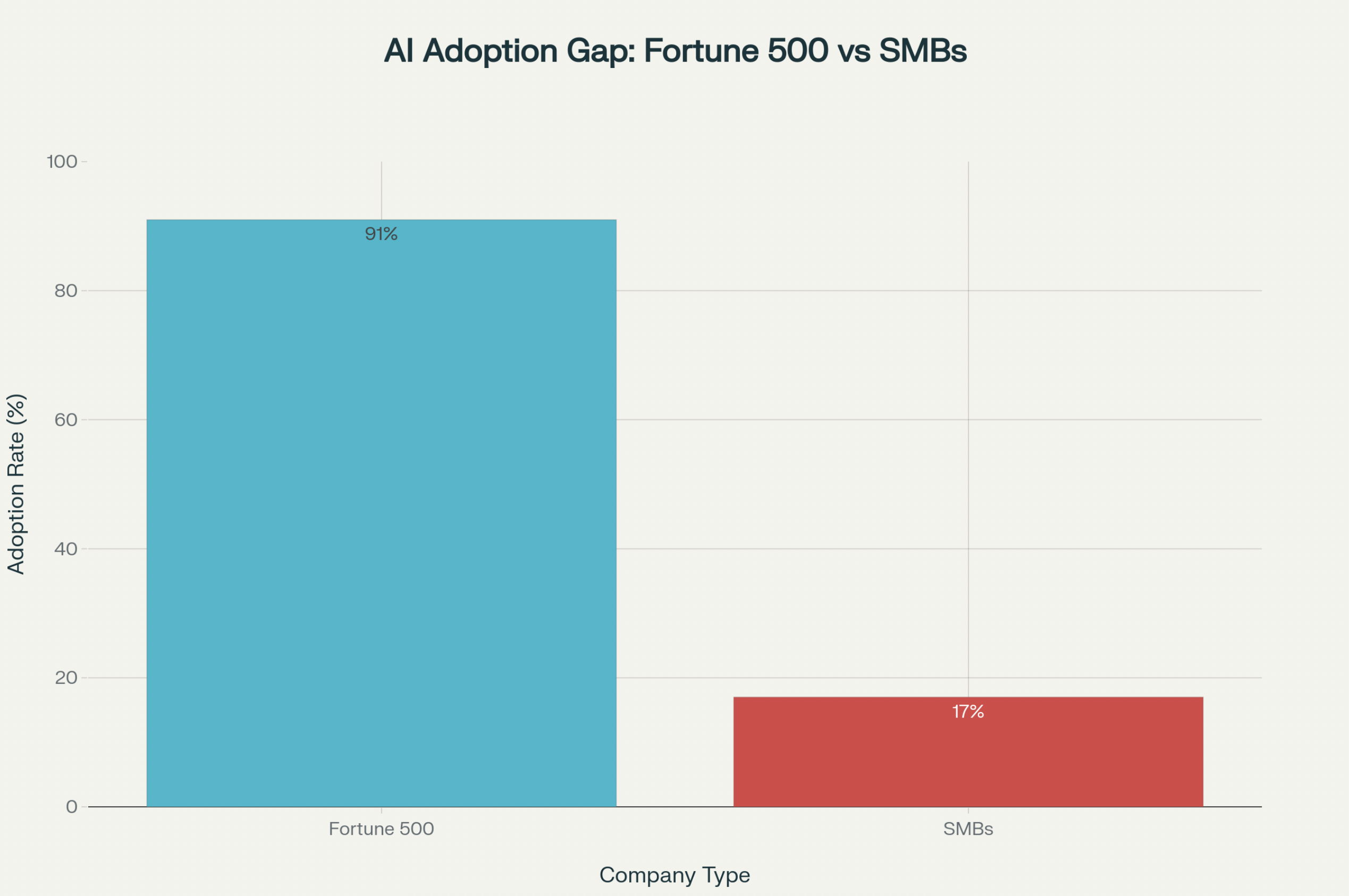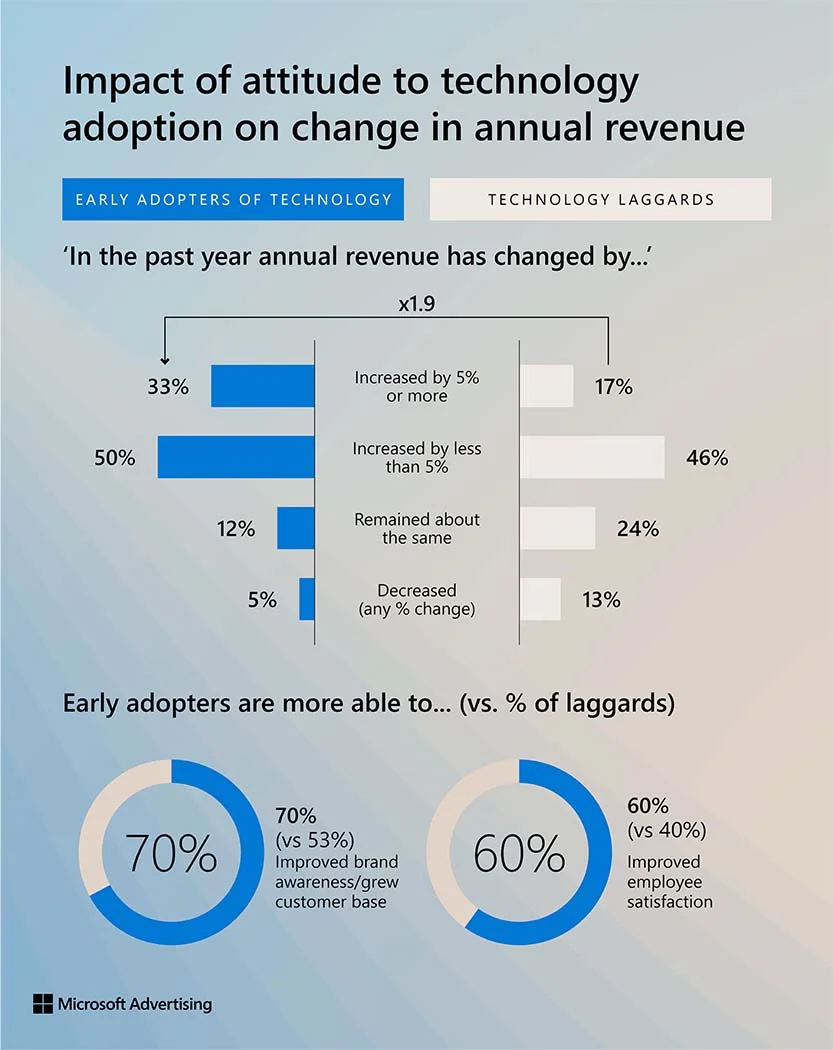
The technology industry's current wave of layoffs, with over 81,000 workers displaced in 2025 alone, represents more than just corporate restructuring—it's creating the largest pool of AI-capable consulting talent in history. At the center of this transformation sits FrontPipe, a growth intelligence company that has identified a critical market gap: while 91% of Fortune 500 companies have integrated AI into their operations, only 17% of small and medium businesses (SMBs) have followed suit. This 74-percentage point chasm represents not just a business opportunity, but a complete paradigm shift in how AI expertise flows from displaced corporate talent into independent consulting practices.

AI adoption rates show a 74-percentage point gap between Fortune 500 companies and small-medium businesses, representing a massive consulting opportunity
The numbers tell a compelling story of industry transformation. Microsoft has cut 10,000 workers, Intel has eliminated 12,000 positions, and Meta has reduced its workforce by 8,000 people. Yet this exodus isn't simply about job losses—it's about talent redistribution. LinkedIn data reveals that 19.6% of displaced tech workers are gravitating toward professional services, primarily consulting and accounting firms. This migration represents the largest infusion of high-level technical talent into the consulting sector in decades.
The displaced workforce brings sophisticated AI and machine learning expertise previously confined to major technology companies. These professionals possess hands-on experience with enterprise-scale AI implementations, having worked on projects that smaller businesses could never access through traditional channels. Their departure from big tech coincides perfectly with an unprecedented demand for AI consulting services among SMBs who recognize they're falling behind in the digital transformation race.

Early adopters of technology see significantly higher revenue growth and improved brand awareness compared to laggards, demonstrating the business benefits of embracing technology
Research consistently shows that SMBs adopting AI technologies see remarkable results: 91% report revenue increases, 87% experience operational scaling benefits, and 86% observe improved profit margins. Yet the implementation gap persists due to a fundamental knowledge and resource deficit. SMBs lack the internal expertise to identify appropriate AI applications, select suitable technologies, and execute successful implementations.
This creates what industry experts call a "competitive extinction event". Companies that fail to integrate AI risk being overwhelmed by competitors who successfully harness these technologies. The pressure is intensifying as AI tools become more accessible and affordable, eliminating traditional barriers to entry while simultaneously raising the stakes for businesses that remain technologically stagnant.

FrontPipe has positioned itself at the intersection of two powerful market forces: the abundance of displaced AI talent and the desperate need for AI expertise among SMBs. The company's "Growth Intelligence System" represents a sophisticated approach to democratizing enterprise-level AI capabilities for smaller businesses. By combining human expertise with machine precision, FrontPipe offers SMBs access to the same AI advantages that Fortune 500 companies use to dominate their markets.
The company's messaging directly addresses the core market opportunity: "While 91% of Fortune 500s use AI in their sales operations, only 17% of growing companies have fully integrated AI processes". This positioning establishes FrontPipe not merely as another consulting firm, but as a bridge between the AI haves and have-nots in the business world.
FrontPipe's approach reflects broader industry trends toward what consulting experts call "productized" services. Rather than offering generic consulting advice, companies like FrontPipe are creating repeatable, scalable AI implementation frameworks that can be deployed across multiple SMB clients. This model addresses both the scalability challenges facing individual consultants and the cost concerns of SMBs who cannot afford traditional enterprise consulting rates.
The evolution toward consortium-based consulting is particularly relevant to FrontPipe's market position. Independent consultants are increasingly forming collaborative groups to tackle larger projects and share resources. This trend enables displaced tech workers to pool their expertise and compete for enterprise-level engagements while maintaining the flexibility and cost advantages that appeal to SMB clients.
The convergence of displaced tech talent and unmet SMB demand creates a market opportunity of staggering proportions. With approximately 33.2 million SMBs in the United States and a 74% AI adoption gap, the potential market encompasses nearly 24.6 million businesses that need AI consulting services.
Conservative estimates suggest that even capturing 1% of this market with average project values of $50,000 would generate $12.3 billion in consulting revenue annually.
The available talent pool is equally impressive. The 81,567 displaced tech workers represent the largest concentration of AI-capable consulting talent ever assembled. These professionals bring enterprise-level experience that was previously unavailable to smaller businesses, creating an unprecedented opportunity for knowledge transfer from major corporations to the broader economy.
Industry data reveals that AI consultants command substantial compensation, with average salaries reaching $125,000 annually for full-time positions. Independent consultants often earn significantly more, with experienced AI specialists charging $300-500 per hour compared to $800-1,500 per hour charged by traditional consulting firms. This pricing advantage makes AI consulting accessible to SMBs while providing attractive income opportunities for displaced tech workers.
The most successful consulting models focus on specific, high-value applications rather than broad AI strategy. Marketing automation setup, predictive analytics implementation, and data integration projects consistently generate the highest returns, with revenue potential ranging from $120,000 to $180,000 per engagement. These project types align perfectly with the expertise of displaced tech workers and the immediate needs of SMBs seeking competitive advantages.
Despite the clear benefits of AI adoption, SMBs face significant barriers to implementation. Many lack the technical sophistication to evaluate AI solutions effectively, while others are deterred by perceived complexity and cost. Successful consulting practices address these concerns through education-focused approaches that demystify AI technologies and demonstrate clear, measurable returns on investment.
The most effective consultants position themselves as strategic partners rather than technical service providers. They invest time in understanding specific business challenges and present AI solutions in terms of business outcomes rather than technical capabilities. This approach builds trust and confidence among SMB leadership teams that may be intimidated by complex technology discussions.
Individual consultants face inherent scalability limitations that can restrict their ability to capture market opportunities. The most successful practices are developing productized service offerings that can be delivered efficiently across multiple clients. These might include standardized AI readiness assessments, template-based implementation frameworks, or sector-specific AI solutions that can be customized for individual businesses.
Technology platforms are enabling new forms of consulting delivery that increase efficiency and reduce costs. Low-code and no-code AI platforms allow consultants to implement solutions without extensive custom development, while collaboration tools enable remote delivery models that expand geographic reach. These technological enablers are particularly important for consultants serving geographically dispersed SMB markets.
Independent consultants possess several key advantages over traditional consulting firms when serving the SMB market. Their lower overhead structure enables competitive pricing that aligns with SMB budgets, while their recent corporate experience provides credibility and current knowledge of AI best practices. Many displaced tech workers also bring industry-specific expertise that traditional generalist consultants lack.
The agility of independent practices allows for faster decision-making and more personalized service delivery. SMB clients often value the direct access to senior expertise that independent consultants provide, contrasting favorably with the junior consultant model common in large firms. This personal relationship building is particularly important in the SMB market, where trust and ongoing support relationships drive long-term success.
The emergence of consulting consortiums represents a significant evolution in how independent consultants compete with established firms. Platforms like Graphite connect enterprise clients with networks of experienced independent consultants, offering the expertise breadth of large firms with the cost advantages and flexibility of independent practices. These models are particularly well-suited to AI consulting, where projects often require diverse technical skills and industry knowledge.
Collaborative approaches also enable risk sharing and resource pooling among independent consultants. Rather than competing against each other, displaced tech workers can form strategic partnerships that enhance their collective capabilities and market presence. This trend is accelerating as more professionals recognize the benefits of collaborative competition over individual competition.
The AI consulting landscape continues to evolve rapidly as new technologies emerge and existing platforms mature. Generative AI tools are democratizing content creation and analysis capabilities, while automation platforms are reducing the technical barriers to AI implementation. These trends favor independent consultants who can quickly adopt and deploy new technologies without the bureaucratic constraints that slow large consulting firms.
The rise of vertical-specific AI solutions is creating new opportunities for consultants with industry expertise. Rather than offering generic AI implementations, successful consultants are developing deep knowledge in specific sectors and creating tailored solutions that address industry-specific challenges and opportunities. This specialization trend plays to the strengths of displaced tech workers who often have extensive experience in particular industries.
Industry experts predict that the independent consulting market will continue growing as businesses seek more agile and cost-effective access to specialized expertise. The combination of remote work technologies, collaborative platforms, and increasing comfort with distributed teams creates favorable conditions for independent consultants to compete effectively with traditional firms.
The AI consulting market specifically is expected to experience explosive growth as the technology gap between leaders and laggards widens. SMBs that delay AI adoption risk being left behind by competitors who successfully integrate these technologies, creating urgency that drives consulting demand. This dynamic favors consultants who can deliver quick, measurable results rather than lengthy strategic studies.
Success in AI consulting requires more than technical expertise—it demands business acumen, sales skills, and the ability to translate complex technologies into clear business value propositions. Displaced tech workers should focus on developing these complementary skills while leveraging their technical backgrounds to establish credibility and differentiation in the market.
Building a successful consulting practice also requires strategic positioning and market focus. Rather than trying to serve all potential clients, successful consultants identify specific industries or business challenges where their expertise provides clear advantages. This focused approach enables more effective marketing, pricing, and service delivery while building reputation and referral networks within targeted market segments.
SMBs considering AI initiatives should prioritize consultants who demonstrate clear understanding of business challenges rather than just technical capabilities. The most valuable consultants combine technical expertise with business experience and can provide realistic assessments of AI opportunities and implementation requirements.
Successful AI implementations typically start with specific, well-defined applications rather than broad transformation initiatives. SMBs should work with consultants who recommend phased approaches that deliver quick wins while building toward more comprehensive AI integration over time. This approach manages risk while building internal confidence and capabilities.
The convergence of mass tech layoffs and urgent SMB demand for AI expertise represents a historic market opportunity that companies like FrontPipe are uniquely positioned to capture. The 81,567 displaced tech workers possess enterprise-level AI expertise that was previously unavailable to smaller businesses, while the 24.6 million SMBs lagging in AI adoption represent an enormous market for consulting services.
This transformation extends beyond simple talent reallocation—it represents a fundamental shift in how AI expertise flows through the economy. Rather than being concentrated in a few major technology companies, AI knowledge is becoming distributed across thousands of independent consultants who can serve previously underserved market segments. The result is a more dynamic, competitive consulting landscape that benefits both displaced workers seeking new opportunities and SMBs seeking affordable access to cutting-edge AI capabilities.
The success of this transformation will depend on the ability of market participants to recognize and adapt to changing dynamics. Companies like FrontPipe that successfully bridge the gap between displaced talent and unmet demand will capture disproportionate value in this emerging market. Similarly, individual consultants who combine technical expertise with business acumen and market focus will build thriving practices that serve the evolving needs of the digital economy.
The golden age of AI consulting has begun, and the companies and individuals who recognize this shift will be positioned to benefit from one of the largest technology-driven market opportunities in business history. The question is not whether this transformation will occur, but how quickly market participants will adapt to capture the tremendous value it represents.